fellowship
-
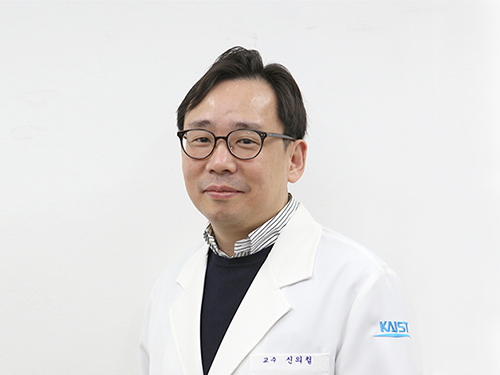 New Members of KAST and Y-KAST 2019
(Professor Eui-Cheol Shin from the Graduate School of Medical Science and Engineering)
Professor Eui-Cheol Shin from the Graduate School of Medical Science and Engineering became a new fellow of the Korean Academy of Science and Technology (KAST) along with 25 other scientists in Korea. He is one of the top virus immunologists in Korea and has published a review article in Nature Reviews Immunology.
Meanwhile KAST selected and announced 26 young scientists under the age 43 who have shown great potential and the creativity to carry out next-generation research. The list of Y-KAST (Young Korean Academy of Science and Technology) includes six KAIST professors: Professor Ji Oon Lee from the Department of Mathematical Sciences, Professor Mi Hee Lim from the Department of Chemistry, Professor Shin-Hyun Kim from the Department of Chemical and Biomolecular Engineering, Professor Jung-Ryul Lee from the Department of Aerospace Engineering, Professor Hyunjoo Jenny Lee from the School of Electrical Engineering, and Professor Yeon Sik Jung from the Department of Materials Science and Engineering.
KAST conferred their fellowships and Y-KAST membership during the New Year Reception.
2019.01.22 View 10969
New Members of KAST and Y-KAST 2019
(Professor Eui-Cheol Shin from the Graduate School of Medical Science and Engineering)
Professor Eui-Cheol Shin from the Graduate School of Medical Science and Engineering became a new fellow of the Korean Academy of Science and Technology (KAST) along with 25 other scientists in Korea. He is one of the top virus immunologists in Korea and has published a review article in Nature Reviews Immunology.
Meanwhile KAST selected and announced 26 young scientists under the age 43 who have shown great potential and the creativity to carry out next-generation research. The list of Y-KAST (Young Korean Academy of Science and Technology) includes six KAIST professors: Professor Ji Oon Lee from the Department of Mathematical Sciences, Professor Mi Hee Lim from the Department of Chemistry, Professor Shin-Hyun Kim from the Department of Chemical and Biomolecular Engineering, Professor Jung-Ryul Lee from the Department of Aerospace Engineering, Professor Hyunjoo Jenny Lee from the School of Electrical Engineering, and Professor Yeon Sik Jung from the Department of Materials Science and Engineering.
KAST conferred their fellowships and Y-KAST membership during the New Year Reception.
2019.01.22 View 10969 -
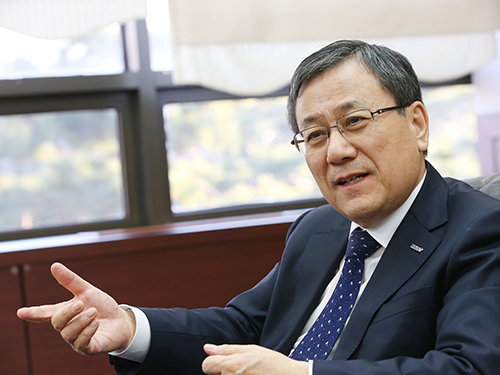 President Shin to be Honored from Northwestern University
(KAIST President Sung-Chul Shin)
President Sung-Chul Shin has been named the recipient of the Distinguished Career Achievement Award 2019 for Alumni of Materials Science and Engineering at Northwestern University.
The awards committee announced last month that the committee decided to award President Shin in recognition of his significant contribution toward materials research, particularly in the field of magnetic materials, and also for the leadership he has demonstrated in higher education. The awards ceremony will take place on May 16 at Northwestern University.
President Shin earned his PhD in material physics at Northwestern in 1984 after completing his MS in condensed matter physics at KAIST in 1977. He is also a graduate of applied physics from Seoul National University.
President Shin, an accomplished scholar in the field of nanoscience and a pioneer of research in nanospinics, has held numerous fellowships including the American Physical Society and received scholarly honor from the Asian Union Magnetics Societies. His research focuses on the artificial synthesis and characterization of nonmagnetic materials, magnetic anisotropy, and magneto-optical phenomena. While studying at Northwestern, he produced novel superlattice multilayer thin film structures with bismuth and lead telluride, noting that they have similar structures.
With his expertise, he joined KAIST in 1989 to dedicate himself to academic contributions. During his professorship in the Department of Physics, he produced about 300 journal papers and 37 patents while fostering 80 graduate students. He served as the first president in Daegu-Gyeongbuk Scientific Technology Research Institute (DGIST) for six years from 2011.
2019.01.09 View 4108
President Shin to be Honored from Northwestern University
(KAIST President Sung-Chul Shin)
President Sung-Chul Shin has been named the recipient of the Distinguished Career Achievement Award 2019 for Alumni of Materials Science and Engineering at Northwestern University.
The awards committee announced last month that the committee decided to award President Shin in recognition of his significant contribution toward materials research, particularly in the field of magnetic materials, and also for the leadership he has demonstrated in higher education. The awards ceremony will take place on May 16 at Northwestern University.
President Shin earned his PhD in material physics at Northwestern in 1984 after completing his MS in condensed matter physics at KAIST in 1977. He is also a graduate of applied physics from Seoul National University.
President Shin, an accomplished scholar in the field of nanoscience and a pioneer of research in nanospinics, has held numerous fellowships including the American Physical Society and received scholarly honor from the Asian Union Magnetics Societies. His research focuses on the artificial synthesis and characterization of nonmagnetic materials, magnetic anisotropy, and magneto-optical phenomena. While studying at Northwestern, he produced novel superlattice multilayer thin film structures with bismuth and lead telluride, noting that they have similar structures.
With his expertise, he joined KAIST in 1989 to dedicate himself to academic contributions. During his professorship in the Department of Physics, he produced about 300 journal papers and 37 patents while fostering 80 graduate students. He served as the first president in Daegu-Gyeongbuk Scientific Technology Research Institute (DGIST) for six years from 2011.
2019.01.09 View 4108 -
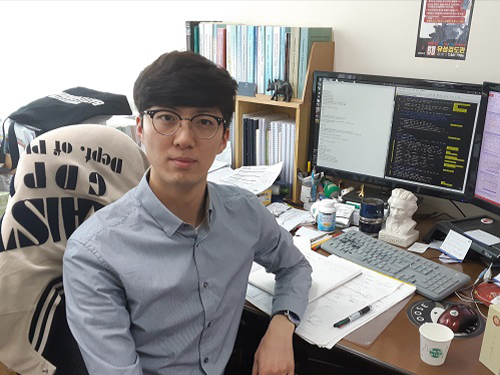 Park Chosen for Principality of Monaco/ITER Postdoctoral Fellowship
(Jaesun Park in the Integrated Master's and Doctoral Degree Program )
Jaesun Park from the Department of Physics, was selected as a Principality of Monaco/ITER Postdoctoral Fellowship recipient.
This program was established by the Principality of Monaco and an international organization, ITER, in January 2008 to support postdoctoral researchers who will be working for ITER. It is a relatively competitive program because it chooses only five people every two years.
The selected postdoctoral researchers will be working for ITER for two years while conducting research projects with outstanding researchers in the field of nuclear fusion.
ITER, one of the most ambitious energy projects, was launched in 1985 with the purpose of carrying out joint research on nuclear fusion energy. Currently, about 800 people are working for this organization.
Seven ITER member countries (i.e. Korea, the European Union, the United States, China, Japan, Russia, and India) are sharing the expenses and engaging in mega-scale science projects. Korea shares 9.1% (20 billion Euro) of the total construction costs of ITER experimental devices.
Park will begin his duties in early 2019.
2018.05.04 View 11024
Park Chosen for Principality of Monaco/ITER Postdoctoral Fellowship
(Jaesun Park in the Integrated Master's and Doctoral Degree Program )
Jaesun Park from the Department of Physics, was selected as a Principality of Monaco/ITER Postdoctoral Fellowship recipient.
This program was established by the Principality of Monaco and an international organization, ITER, in January 2008 to support postdoctoral researchers who will be working for ITER. It is a relatively competitive program because it chooses only five people every two years.
The selected postdoctoral researchers will be working for ITER for two years while conducting research projects with outstanding researchers in the field of nuclear fusion.
ITER, one of the most ambitious energy projects, was launched in 1985 with the purpose of carrying out joint research on nuclear fusion energy. Currently, about 800 people are working for this organization.
Seven ITER member countries (i.e. Korea, the European Union, the United States, China, Japan, Russia, and India) are sharing the expenses and engaging in mega-scale science projects. Korea shares 9.1% (20 billion Euro) of the total construction costs of ITER experimental devices.
Park will begin his duties in early 2019.
2018.05.04 View 11024 -
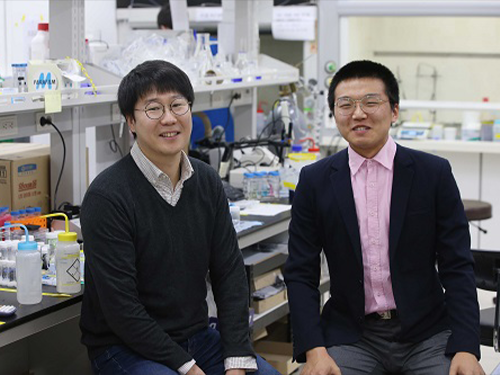 Undergrad's Paper Chosen as the Cover Article in Soft Matter
(from left: Research Professor KyuHan Kim and Undergrad Student Subeen Kim)
A KAIST undergraduate student, Subeen Kim, had his paper chosen as the cover article in an international journal during his senior year.
There have been an increasing number of undergraduate students who were published as the first author because the KAIST Undergraduate Research Participation program allows more active research participation by undergraduate students.
Through URP, Kim successfully published his paper in the internationally-renowned journal, Soft Matter, which is published by the Royal Society of Chemistry, and it was chosen as the cover article of that journal in February 2018.
This publication means a lot to him because he designed the cover image himself, based on his imagination and observations.
His research is about controllable one-step double emulsion formation. Double emulsion is a system in which dispersed droplets contain additional immiscible liquid droplets.
Having great retention ability, double emulsion has been used in various applications in the food industry, in cosmetics, and for drug delivery. Nevertheless, two-step emulsification is a conventional approach to produce double emulsions that typically leads to partial destabilization of the emulsion formed during the initial stage. Hence, it does not ensure the stability of a double emulsion. On the other hand, a microfluidic approach with various flow-focusing techniques has been developed, but it has low production efficiency and thus limited industrial applications.
Kim’s results came from the process of phase inversion to solve this problem. He identified the instant formation of double emulsions during the process of phase inversion. Based on this finding, he proposed criteria to achieve high stability of double emulsion.
Through constant research, he developed a quite general method using a combination of an oil soluble poly methyl methacrylate (PMMA) and hydrophobic silica nanoparticle (HDK H18). This new method enables one-step and stable production of double emersions in a stable manner. It also allows control of the number and the volume of inner oil droplets inside the outer water droplets by adjusting PMMA and HDK H18.
Kim enrolled at KAIST as a KAIST Presidential Fellowship and Presidential Science Scholarship in 2014. While studying both chemical and biomolecular engineering and chemistry he has been developing his hypothesis and conducting research.
He was able to begin conducting research because he has taken part in URP projects twice. In his sophomore year, he studied the formation of high internal phase double emulsions. After one year, he conducted research to produce superabsorbent resins, which are the base material for diapers, by using colloid particles. Using partial research outcomes, he published his paper in Nature Communications as a second author.
Kim said, “Double majoring the chemical and biomolecular engineering and chemistry has helped me producing this outcome. I hope that this research contributes to commercializing double emulsions. I will continue to identify accurate principles to produce chemicals that can be controlled exquisitely.”
Figure 1. The cover article of Soft Matter
2018.05.03 View 13020
Undergrad's Paper Chosen as the Cover Article in Soft Matter
(from left: Research Professor KyuHan Kim and Undergrad Student Subeen Kim)
A KAIST undergraduate student, Subeen Kim, had his paper chosen as the cover article in an international journal during his senior year.
There have been an increasing number of undergraduate students who were published as the first author because the KAIST Undergraduate Research Participation program allows more active research participation by undergraduate students.
Through URP, Kim successfully published his paper in the internationally-renowned journal, Soft Matter, which is published by the Royal Society of Chemistry, and it was chosen as the cover article of that journal in February 2018.
This publication means a lot to him because he designed the cover image himself, based on his imagination and observations.
His research is about controllable one-step double emulsion formation. Double emulsion is a system in which dispersed droplets contain additional immiscible liquid droplets.
Having great retention ability, double emulsion has been used in various applications in the food industry, in cosmetics, and for drug delivery. Nevertheless, two-step emulsification is a conventional approach to produce double emulsions that typically leads to partial destabilization of the emulsion formed during the initial stage. Hence, it does not ensure the stability of a double emulsion. On the other hand, a microfluidic approach with various flow-focusing techniques has been developed, but it has low production efficiency and thus limited industrial applications.
Kim’s results came from the process of phase inversion to solve this problem. He identified the instant formation of double emulsions during the process of phase inversion. Based on this finding, he proposed criteria to achieve high stability of double emulsion.
Through constant research, he developed a quite general method using a combination of an oil soluble poly methyl methacrylate (PMMA) and hydrophobic silica nanoparticle (HDK H18). This new method enables one-step and stable production of double emersions in a stable manner. It also allows control of the number and the volume of inner oil droplets inside the outer water droplets by adjusting PMMA and HDK H18.
Kim enrolled at KAIST as a KAIST Presidential Fellowship and Presidential Science Scholarship in 2014. While studying both chemical and biomolecular engineering and chemistry he has been developing his hypothesis and conducting research.
He was able to begin conducting research because he has taken part in URP projects twice. In his sophomore year, he studied the formation of high internal phase double emulsions. After one year, he conducted research to produce superabsorbent resins, which are the base material for diapers, by using colloid particles. Using partial research outcomes, he published his paper in Nature Communications as a second author.
Kim said, “Double majoring the chemical and biomolecular engineering and chemistry has helped me producing this outcome. I hope that this research contributes to commercializing double emulsions. I will continue to identify accurate principles to produce chemicals that can be controlled exquisitely.”
Figure 1. The cover article of Soft Matter
2018.05.03 View 13020 -
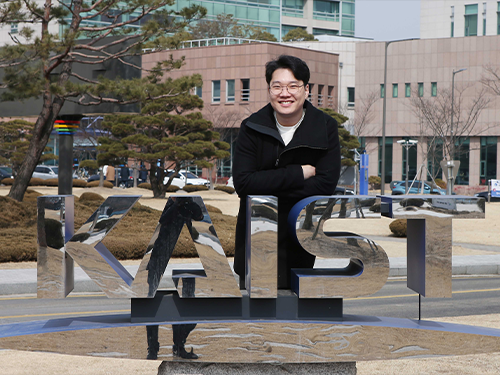 Soul-Searching & Odds-Defying Determination: A Commencement Story of Dr. Tae-Hyun Oh
(Dr. Tae-Hyun Oh, one of the 2736 graduates of the 2018)
Each and every one of the 2,736 graduates has come a long way to the 2018 Commencement. Tae-Hyun Oh, who just started his new research career at MIT after completing his Ph.D. at KAIST, is no exception.
Unlike the most KAIST freshmen straight out of the ingenious science academies of Korea, he is among the many who endured very challenging and turbulent adolescent years. Buffeted by family instability and struggling during his time at school, he saw himself trapped by seemingly impenetrable barriers. His mother, who hated to see his struggling, advised him to take a break to reflect on who he is and what he wanted to do.
After dropping out of high school in his first year, ways to make money and support his family occupied his thoughts. He took on odd jobs from a car body shop to a gas station, but the real world was very tough and sometimes even cruel to the high school dropout.
Bias and prejudice stigmatizing dropouts hurt him so much. He often overheard a parent who dropped by the body shop that he worked in saying, “If you do not study hard, you will end up like this guy.” Hearing such things terrified him and awoke his sense of purpose. So he decided to do something meaningful and be a better man than he was.
“I didn’t like the person I was growing up to become. I needed to find myself and get away from the place I was growing up. It was my adventure and it was the best decision I ever made,” says Oh.
After completing his high school diploma national certificate, he planned to apply to an engineering college. On his second try, he gained admission into the Department of Electrical Engineering at Kwang Woon University with a full scholarship. He was so thrilled for this opportunity and hoped he could do well at college. Signal processing and image processing became the interest of his research and he finished his undergraduate degree summa cum laude.
Gaining confidence in his studies, he searched around graduate school department websites in Korea to select the path he was interested in. Among others, the Robotics and Computer Vision Lab of Professor In-So Kweon at the Department of Electrical Engineering at KAIST was attractive to him.
Professor Kweon’s lab is globally renowned for robot vision technology. Their technologies were applied into HUBO, the KAIST-developed bimodal humanoid robot that won the 2015 DARPA Challenges.
“I am so appreciate of Professor Kweon, who accepted and guided me,” he said. Under Professor Kweon’s advising, he could finish his Master’s and Ph.D. courses in seven years. The mathematical modeling on fundamental computer algorithms became his main research topic.
While at KAIST, his academic research has blossomed. He won a total of 13 research prizes sponsored by corporations at home and abroad such as Kolon, Samsung, Hyundai Motors, and Qualcomm.
In 2015, he won the Microsoft Research Asia Fellowship as the sole Korean among 13 Ph.D. candidates in the Asian region. With the MSRA fellowship, he could intern at the MS Research Beijing Office for half a year and then in Redmond, Washington in the US.
“Professor Kweon’s lab filled me up with knowledge. Whenever I presented our team’s paper at an international conference, I was amazed by the strong interest shown by foreign experts, researchers, and professors. Their strong support and interest encouraged me a lot. I was fully charged with the belief that I could go abroad and explore more opportunities,” he said.
Dr. Oh, who completed his dissertation last fall, now works at the Department of Electrical Engineering and Computer Science at MIT under Professor Wojciech Matusik.
“I think the research environment at KAIST is on par with MIT. I have very rich resources for my studies and research at both schools, but at MIT the working culture is a little different and it remains a big challenge for me. I am still not familiar with collaborative work with colleagues from very diverse backgrounds and countries, and to persuade them and communicate with them is very tough. But I think I am getting better and better,” he said.
Oh, who is an avid computer game player as well, said life seems to be a game. The level of the game will be upgraded to the next level after something is accomplished. He feels great joy when he is moving up and he believes such diverse experiences have helped him become a better person day by day. Once he identified what gave him a strong sense of purpose, he wasn’t stressed out by his studies any more. He was so excited to be able to follow his passion and is ready for the next challenge.
2018.02.23 View 13236
Soul-Searching & Odds-Defying Determination: A Commencement Story of Dr. Tae-Hyun Oh
(Dr. Tae-Hyun Oh, one of the 2736 graduates of the 2018)
Each and every one of the 2,736 graduates has come a long way to the 2018 Commencement. Tae-Hyun Oh, who just started his new research career at MIT after completing his Ph.D. at KAIST, is no exception.
Unlike the most KAIST freshmen straight out of the ingenious science academies of Korea, he is among the many who endured very challenging and turbulent adolescent years. Buffeted by family instability and struggling during his time at school, he saw himself trapped by seemingly impenetrable barriers. His mother, who hated to see his struggling, advised him to take a break to reflect on who he is and what he wanted to do.
After dropping out of high school in his first year, ways to make money and support his family occupied his thoughts. He took on odd jobs from a car body shop to a gas station, but the real world was very tough and sometimes even cruel to the high school dropout.
Bias and prejudice stigmatizing dropouts hurt him so much. He often overheard a parent who dropped by the body shop that he worked in saying, “If you do not study hard, you will end up like this guy.” Hearing such things terrified him and awoke his sense of purpose. So he decided to do something meaningful and be a better man than he was.
“I didn’t like the person I was growing up to become. I needed to find myself and get away from the place I was growing up. It was my adventure and it was the best decision I ever made,” says Oh.
After completing his high school diploma national certificate, he planned to apply to an engineering college. On his second try, he gained admission into the Department of Electrical Engineering at Kwang Woon University with a full scholarship. He was so thrilled for this opportunity and hoped he could do well at college. Signal processing and image processing became the interest of his research and he finished his undergraduate degree summa cum laude.
Gaining confidence in his studies, he searched around graduate school department websites in Korea to select the path he was interested in. Among others, the Robotics and Computer Vision Lab of Professor In-So Kweon at the Department of Electrical Engineering at KAIST was attractive to him.
Professor Kweon’s lab is globally renowned for robot vision technology. Their technologies were applied into HUBO, the KAIST-developed bimodal humanoid robot that won the 2015 DARPA Challenges.
“I am so appreciate of Professor Kweon, who accepted and guided me,” he said. Under Professor Kweon’s advising, he could finish his Master’s and Ph.D. courses in seven years. The mathematical modeling on fundamental computer algorithms became his main research topic.
While at KAIST, his academic research has blossomed. He won a total of 13 research prizes sponsored by corporations at home and abroad such as Kolon, Samsung, Hyundai Motors, and Qualcomm.
In 2015, he won the Microsoft Research Asia Fellowship as the sole Korean among 13 Ph.D. candidates in the Asian region. With the MSRA fellowship, he could intern at the MS Research Beijing Office for half a year and then in Redmond, Washington in the US.
“Professor Kweon’s lab filled me up with knowledge. Whenever I presented our team’s paper at an international conference, I was amazed by the strong interest shown by foreign experts, researchers, and professors. Their strong support and interest encouraged me a lot. I was fully charged with the belief that I could go abroad and explore more opportunities,” he said.
Dr. Oh, who completed his dissertation last fall, now works at the Department of Electrical Engineering and Computer Science at MIT under Professor Wojciech Matusik.
“I think the research environment at KAIST is on par with MIT. I have very rich resources for my studies and research at both schools, but at MIT the working culture is a little different and it remains a big challenge for me. I am still not familiar with collaborative work with colleagues from very diverse backgrounds and countries, and to persuade them and communicate with them is very tough. But I think I am getting better and better,” he said.
Oh, who is an avid computer game player as well, said life seems to be a game. The level of the game will be upgraded to the next level after something is accomplished. He feels great joy when he is moving up and he believes such diverse experiences have helped him become a better person day by day. Once he identified what gave him a strong sense of purpose, he wasn’t stressed out by his studies any more. He was so excited to be able to follow his passion and is ready for the next challenge.
2018.02.23 View 13236 -
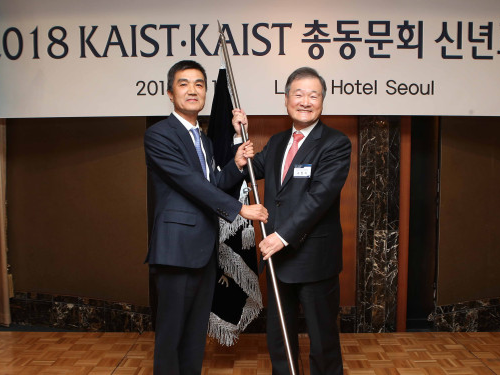 Harnessing the Strength of KAIST Alumni: New Head of KAA Inaugurated
KAIST alumni gathered in Seoul on January 13 to celebrate the New Year and the newly-elected leadership of the KAIST Alumni Association (KAA). More than 300 alumni, including President Sung-Chul Shin who is also an alumnus of KAIST, joined the gala event held at the Lotte Hotel.
Photo: Ki-Chul Cha(left) and Jung Sik Koh(right)
The KAA inaugurated its new president, Ki-Chul Cha, who was preceded by Jung Sik Koh, the former CEO at the Korea Resources Corporation. His term starts from January 2018 to December 2020.
Cha is the CEO of Inbody Co Ltd., a global company specializing in developing and selling medical instruments, such as a body composition analyzers, and medical solutions. He is also an adjunct professor in the Department of Mechanical Engineering at Yonsei University. Cha obtained a master’s degree in Mechanical Engineering at KAIST in 1980, and a Ph.D. in Bioengineering at the University of Utah, before finishing his post-doc fellowship at Harvard Medical School.
Cha plans to explore the idea that alumni engagement, saying, “KAIST stays as a home in the memories of 60,000 alumni. I will dedicate myself to stimulating the alumni association to make KAISTians proud.”
At the gala event, the KAA awarded the Alumni of the Year honor to six alumni who distinguished themselves in the areas of professional achievement, humanitarianism, and public service. They are the Director of Startup KAIST Professor Byoung Yoon Kim; President of LG Chem Ltd and Head of Battery Research and Development Myung Hwan Kim; Director of INNOX Advanced Materials Co., Ltd Kyung Ho Chang; Vice President of the Korea International Trade Association Jung-Kwan Kim; CEO of Samsung Electro-Mechanics Yun-Tae Lee; and CEO of ENF Technology Jinbae Jung.
Photo: President Shin(far right) poses with six awardees of the Distinguished Alumni Award and the former President of KAA, Koh(far left)
2018.01.16 View 12643
Harnessing the Strength of KAIST Alumni: New Head of KAA Inaugurated
KAIST alumni gathered in Seoul on January 13 to celebrate the New Year and the newly-elected leadership of the KAIST Alumni Association (KAA). More than 300 alumni, including President Sung-Chul Shin who is also an alumnus of KAIST, joined the gala event held at the Lotte Hotel.
Photo: Ki-Chul Cha(left) and Jung Sik Koh(right)
The KAA inaugurated its new president, Ki-Chul Cha, who was preceded by Jung Sik Koh, the former CEO at the Korea Resources Corporation. His term starts from January 2018 to December 2020.
Cha is the CEO of Inbody Co Ltd., a global company specializing in developing and selling medical instruments, such as a body composition analyzers, and medical solutions. He is also an adjunct professor in the Department of Mechanical Engineering at Yonsei University. Cha obtained a master’s degree in Mechanical Engineering at KAIST in 1980, and a Ph.D. in Bioengineering at the University of Utah, before finishing his post-doc fellowship at Harvard Medical School.
Cha plans to explore the idea that alumni engagement, saying, “KAIST stays as a home in the memories of 60,000 alumni. I will dedicate myself to stimulating the alumni association to make KAISTians proud.”
At the gala event, the KAA awarded the Alumni of the Year honor to six alumni who distinguished themselves in the areas of professional achievement, humanitarianism, and public service. They are the Director of Startup KAIST Professor Byoung Yoon Kim; President of LG Chem Ltd and Head of Battery Research and Development Myung Hwan Kim; Director of INNOX Advanced Materials Co., Ltd Kyung Ho Chang; Vice President of the Korea International Trade Association Jung-Kwan Kim; CEO of Samsung Electro-Mechanics Yun-Tae Lee; and CEO of ENF Technology Jinbae Jung.
Photo: President Shin(far right) poses with six awardees of the Distinguished Alumni Award and the former President of KAA, Koh(far left)
2018.01.16 View 12643 -
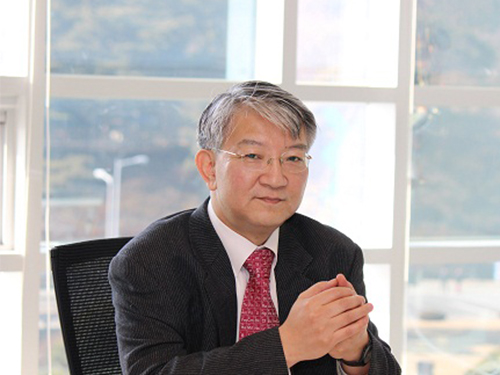 Distinguished Professor Sang Yup Lee Named NAI Fellow
(Distinguished Professor Sang Yup Lee)
Distinguished Professor Sang Yup Lee of the Department of Chemical and Biomolecular Engineering was named to the National Academy of Inventors in the US. He is the first Korean scholar ever elected as a NAI fellow.
The NAI is a non-profit member organization with over 4,000 individual inventors and fellows spanning more than 250 institutions worldwide. It is comprised of universities as well as governmental and non-profit research institutes. The academy was founded in 2010 to recognize and encourage inventors with patents from the US Patent and Trademark Office. So far, 575 fellows from 229 institutions have been elected.
The academy said Professor Lee has been recognized for fellowship induction as he has demonstrated a highly prolific spirit of innovation in creating or facilitating outstanding inventions that have made a tangible impact on quality of life, economic development, and the welfare of society.
Distinguished Professor Lee, a pioneering researcher and scholar in the field of systems metabolic engineering, was ranked in the top 1% of highly cited researchers (HCR) this year. Over the past 11 years, he published more than 130,000 articles in prestigious journals around the world. He has been cited more than 34,000 times since he started working at KAIST in 1994.
He is also the first Korean ever elected to both the National Academy of Sciences (NAS) and the National Academy of Engineering (NAE) in the US, becoming the one of 13 foreign scholars in the world holding two prestigious institutions’ fellowships.
Dr. Lee is currently the dean of KAIST Institutes, the world-leading institute for multi and interdisciplinary research. He is also serving as co-chair of the Global Council on Biotechnology and is a member of the Global Future Council on the Fourth Industrial Revolution at the World Economic Forum.
2017.12.13 View 10516
Distinguished Professor Sang Yup Lee Named NAI Fellow
(Distinguished Professor Sang Yup Lee)
Distinguished Professor Sang Yup Lee of the Department of Chemical and Biomolecular Engineering was named to the National Academy of Inventors in the US. He is the first Korean scholar ever elected as a NAI fellow.
The NAI is a non-profit member organization with over 4,000 individual inventors and fellows spanning more than 250 institutions worldwide. It is comprised of universities as well as governmental and non-profit research institutes. The academy was founded in 2010 to recognize and encourage inventors with patents from the US Patent and Trademark Office. So far, 575 fellows from 229 institutions have been elected.
The academy said Professor Lee has been recognized for fellowship induction as he has demonstrated a highly prolific spirit of innovation in creating or facilitating outstanding inventions that have made a tangible impact on quality of life, economic development, and the welfare of society.
Distinguished Professor Lee, a pioneering researcher and scholar in the field of systems metabolic engineering, was ranked in the top 1% of highly cited researchers (HCR) this year. Over the past 11 years, he published more than 130,000 articles in prestigious journals around the world. He has been cited more than 34,000 times since he started working at KAIST in 1994.
He is also the first Korean ever elected to both the National Academy of Sciences (NAS) and the National Academy of Engineering (NAE) in the US, becoming the one of 13 foreign scholars in the world holding two prestigious institutions’ fellowships.
Dr. Lee is currently the dean of KAIST Institutes, the world-leading institute for multi and interdisciplinary research. He is also serving as co-chair of the Global Council on Biotechnology and is a member of the Global Future Council on the Fourth Industrial Revolution at the World Economic Forum.
2017.12.13 View 10516 -
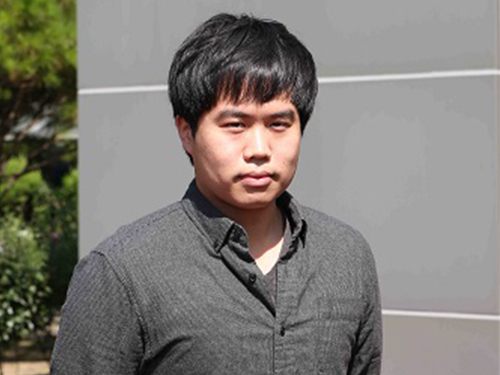 Sangeun Oh Recognized as a 2017 Google Fellow
Sangeun Oh, a Ph.D. candidate in the School of Computing was selected as a Google PhD Fellow in 2017. He is one of 47 awardees of the Google PhD Fellowship in the world.
The Google PhD Fellowship awards students showing outstanding performance in the field of computer science and related research. Since being established in 2009, the program has provided various benefits, including scholarships worth $10,000 USD and one-to-one research discussion with mentors from Google.
His research work on a mobile system that allows interactions among various kinds of smart devices was recognized in the field of mobile computing. He developed a mobile platform that allows smart devices to share diverse functions, including logins, payments, and sensors. This technology provides numerous user experiences that existing mobile platforms could not offer. Through cross-device functionality sharing, users can utilize multiple smart devices in a more convenient manner. The research was presented at The Annual International Conference on Mobile Systems, Applications, and Services (MobiSys) of the Association for Computing Machinery in July, 2017.
Oh said, “I would like to express my gratitude to my advisor, the professors in the School of Computing, and my lab colleagues. I will devote myself to carrying out more research in order to contribute to society.”
His advisor, Insik Shin, a professor in the School of Computing said, “Being recognized as a Google PhD Fellow is an honor to both the student as well as KAIST. I strongly anticipate and believe that Oh will make the next step by carrying out good quality research.”
2017.09.27 View 14833
Sangeun Oh Recognized as a 2017 Google Fellow
Sangeun Oh, a Ph.D. candidate in the School of Computing was selected as a Google PhD Fellow in 2017. He is one of 47 awardees of the Google PhD Fellowship in the world.
The Google PhD Fellowship awards students showing outstanding performance in the field of computer science and related research. Since being established in 2009, the program has provided various benefits, including scholarships worth $10,000 USD and one-to-one research discussion with mentors from Google.
His research work on a mobile system that allows interactions among various kinds of smart devices was recognized in the field of mobile computing. He developed a mobile platform that allows smart devices to share diverse functions, including logins, payments, and sensors. This technology provides numerous user experiences that existing mobile platforms could not offer. Through cross-device functionality sharing, users can utilize multiple smart devices in a more convenient manner. The research was presented at The Annual International Conference on Mobile Systems, Applications, and Services (MobiSys) of the Association for Computing Machinery in July, 2017.
Oh said, “I would like to express my gratitude to my advisor, the professors in the School of Computing, and my lab colleagues. I will devote myself to carrying out more research in order to contribute to society.”
His advisor, Insik Shin, a professor in the School of Computing said, “Being recognized as a Google PhD Fellow is an honor to both the student as well as KAIST. I strongly anticipate and believe that Oh will make the next step by carrying out good quality research.”
2017.09.27 View 14833 -
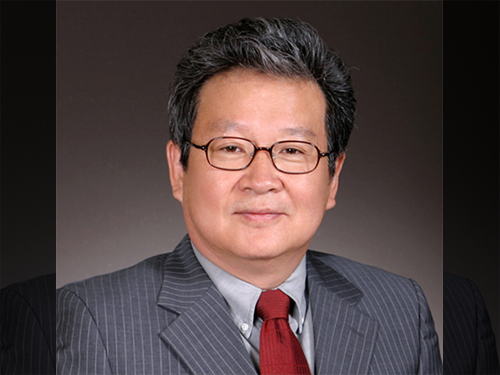 Professor Poong Hyun Seong Selected as Fellow of the ANS
Professor Poong Hyun Seong of the Department of Nuclear and Quantum Engineering was selected as a fellow of the American Nuclear Society.
The selection was announced at their annual meeting held in San Francisco on June 12, in recognition of Professor Seong's contributions to the field of nuclear instrumentation, control andhuman factors engineering.
Founded in 1954, the American Nuclear Society selects scholars who have made outstanding achievements and contributions to the development of the nuclear engineering field each year.
Professor Seong's researches in the field of nuclear instrumentation, control and human factors engineering have contributed to the safe operation of nuclear power plants, to the development of systems to maintain nuclear power plants safely in the event of emergency and to the enhancement of effective response capabilities of nuclear power plant operators. His researches significantly contributed to the safety improvement of nuclear power plants and have been recognized worldwide.
Professor Seong said, "Korea has emerged as a nuclear powerhouse. I think not only my academic career but our national reputation in the field of nuclear research has been well recognized by our global peers.” Professor Seong has served as president of the Korean Nuclear Society, editor in chief of Nuclear Engineering and Technology, and as a commissioner of the Korean Nuclear Safety Commission. He is currently working as a commissioner of the Korean Atomic Energy Commission.
2017.06.29 View 9498
Professor Poong Hyun Seong Selected as Fellow of the ANS
Professor Poong Hyun Seong of the Department of Nuclear and Quantum Engineering was selected as a fellow of the American Nuclear Society.
The selection was announced at their annual meeting held in San Francisco on June 12, in recognition of Professor Seong's contributions to the field of nuclear instrumentation, control andhuman factors engineering.
Founded in 1954, the American Nuclear Society selects scholars who have made outstanding achievements and contributions to the development of the nuclear engineering field each year.
Professor Seong's researches in the field of nuclear instrumentation, control and human factors engineering have contributed to the safe operation of nuclear power plants, to the development of systems to maintain nuclear power plants safely in the event of emergency and to the enhancement of effective response capabilities of nuclear power plant operators. His researches significantly contributed to the safety improvement of nuclear power plants and have been recognized worldwide.
Professor Seong said, "Korea has emerged as a nuclear powerhouse. I think not only my academic career but our national reputation in the field of nuclear research has been well recognized by our global peers.” Professor Seong has served as president of the Korean Nuclear Society, editor in chief of Nuclear Engineering and Technology, and as a commissioner of the Korean Nuclear Safety Commission. He is currently working as a commissioner of the Korean Atomic Energy Commission.
2017.06.29 View 9498 -
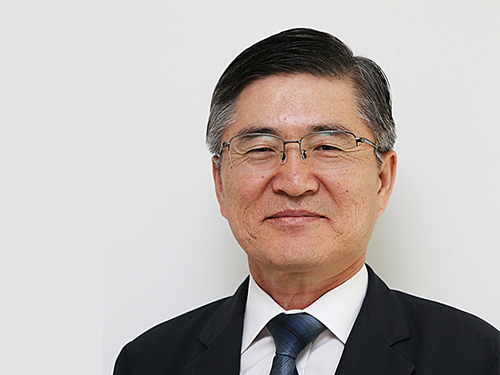 Professor Kwangjo Kim Named as Fellow of IACR
Professor Kwangjo Kim of the Graduate School of Information Security has been selected as a fellow of the International Association for Cryptologic Research (IACR).
The IACR has honored outstanding scholars who have achieved academic excellence in cryptologic research since 2004. He is the first Korean scholar to receive an IACR fellowship.
The IACR, established in 1981, is responsible for organizing international cryptologic conferences every year including the three major cryptologic academic conferences Eurocrypt, Crypto, and Asiacript. The IACR also sponsors workshop series such as the Theory of Cryptography Conference (TCC), the Workshop on Fast Software Encryption (FSE), the Public Key Cryptography Workshop (PKC), and Cryptographic Hardware and Embedded Systems (CHES).
Professor Kim, an internationally acclaimed scholar in the fields of cryptology and information security theory and its applications, was recognized for his outstanding academic achievements and leadership. He has made significant contributions to cryptology in Korea by hosting Asiacript in 1996 and 2001 as well as CHES in 2014. During his 34 years of academic activities, he has published more than 80 SCI journal papers and garnered more than 20,000 citations.
Professor Kim served on the board of the directors of the IACR from 2000 to 2004 and was the chairperson of the Asiacript Steering Committee from 2005 to 2008. He is on the editorial board of the online journal Cryptography.
Professor Kim said, “I am so humbled and honored to be named as a fellow of such a prestigious academic association. I will continue to strive to assist highly educated information security personnel with further research in cryptology.”
2017.03.16 View 10358
Professor Kwangjo Kim Named as Fellow of IACR
Professor Kwangjo Kim of the Graduate School of Information Security has been selected as a fellow of the International Association for Cryptologic Research (IACR).
The IACR has honored outstanding scholars who have achieved academic excellence in cryptologic research since 2004. He is the first Korean scholar to receive an IACR fellowship.
The IACR, established in 1981, is responsible for organizing international cryptologic conferences every year including the three major cryptologic academic conferences Eurocrypt, Crypto, and Asiacript. The IACR also sponsors workshop series such as the Theory of Cryptography Conference (TCC), the Workshop on Fast Software Encryption (FSE), the Public Key Cryptography Workshop (PKC), and Cryptographic Hardware and Embedded Systems (CHES).
Professor Kim, an internationally acclaimed scholar in the fields of cryptology and information security theory and its applications, was recognized for his outstanding academic achievements and leadership. He has made significant contributions to cryptology in Korea by hosting Asiacript in 1996 and 2001 as well as CHES in 2014. During his 34 years of academic activities, he has published more than 80 SCI journal papers and garnered more than 20,000 citations.
Professor Kim served on the board of the directors of the IACR from 2000 to 2004 and was the chairperson of the Asiacript Steering Committee from 2005 to 2008. He is on the editorial board of the online journal Cryptography.
Professor Kim said, “I am so humbled and honored to be named as a fellow of such a prestigious academic association. I will continue to strive to assist highly educated information security personnel with further research in cryptology.”
2017.03.16 View 10358 -
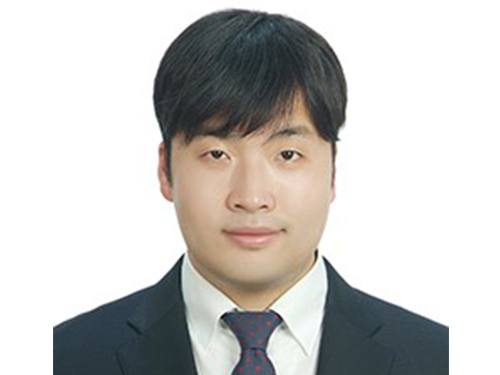 A KAIST Alumnus Receives the Marie Sklodowska-Curie Individual Fellowships
Dr. Je-Kyung Ryu, a graduate of the Physics Department at KAIST in 2014, received the 2017 Marie Sklodowska-Curie Individual Fellowship.
Established in 1996, the Marie Sklodowska-Curie Individual Fellowships support young scientists in or outside Europe to help them grow as independent researchers. The recipients are recognized to have the highest potential to make a difference in science and technology and work on research and innovation.
Dr. Ryu is currently working as a postdoctoral researcher at the Cees Dekker Lab in the Department of Bionanoscience at the Kavli Institute of Nanoscience at Delft University of Technology (TU Delft), Netherlands.
He was among six international researchers at TU Delft who were awarded this research grant.
The grant of 177,000 euros will be offered for two years from March 2017 to February 2019 to cover his salary and research expenses.
For a news article published by TU Delft on the award, please click below:
QN and BN Successfully Attract Young Scientific Talent
February 1, 2017
2017.02.22 View 7674
A KAIST Alumnus Receives the Marie Sklodowska-Curie Individual Fellowships
Dr. Je-Kyung Ryu, a graduate of the Physics Department at KAIST in 2014, received the 2017 Marie Sklodowska-Curie Individual Fellowship.
Established in 1996, the Marie Sklodowska-Curie Individual Fellowships support young scientists in or outside Europe to help them grow as independent researchers. The recipients are recognized to have the highest potential to make a difference in science and technology and work on research and innovation.
Dr. Ryu is currently working as a postdoctoral researcher at the Cees Dekker Lab in the Department of Bionanoscience at the Kavli Institute of Nanoscience at Delft University of Technology (TU Delft), Netherlands.
He was among six international researchers at TU Delft who were awarded this research grant.
The grant of 177,000 euros will be offered for two years from March 2017 to February 2019 to cover his salary and research expenses.
For a news article published by TU Delft on the award, please click below:
QN and BN Successfully Attract Young Scientific Talent
February 1, 2017
2017.02.22 View 7674 -
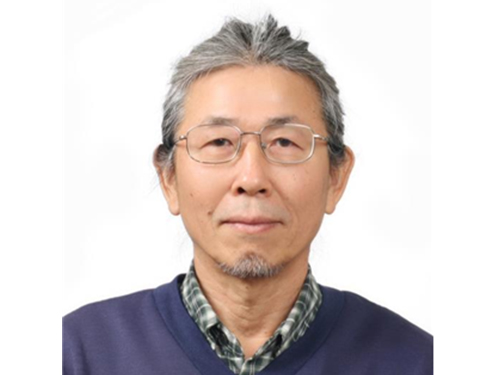 Professor Suck-Joo Na Receives the 2016 Humboldt Research Award
The Alexander von Humboldt Foundation, established by the German government in 1953, promotes academic cooperation and exchange among scientists and scholars from Germany and abroad. The foundation has bestowed this year's award to Professor Suck-Joo Na of KAIST's Mechanical Engineering Department in recognition of his lifetime achievements.
Professor Na's main interests are in the fields of arc and laser welding, computational fluid dynamics simulation, residual stress and distortion, and design of welded structures. He has received numerous honors and awards including the Research Fellowship Award from the Alexander von Humboldt Foundation (1989), the Excellent Research Paper Award from the Korean Welding and Joining Society (1993), the Charles H. Jennings Memorial Award from the American Welding Society (2003), and the Yoshiaki Arata Award from the International Institute of Welding (2014).
The Humboldt Research Award is granted annually to up to 100 academics whose fundamental discoveries, new theories, or insights have had a significant impact on their own discipline and who are expected to continue producing cutting-edge achievements in the future.
The award winners also receive a research grant of 60,000 Euros and are invited to work up to one year with colleagues at research institutions in Germany. Nominations for the award are made only by established academic institutions in Germany.
Professor Na will collaborate with a research team led by Professor Michael Rethmeier at the Berlin-based Federal Institute for Materials Research and Testing (BAM) to conduct research in laser welding and selective laser melting, as well as the mathematical analysis of these manufacturing processes from July 2017 to the end of February 2018.
2016.12.19 View 8557
Professor Suck-Joo Na Receives the 2016 Humboldt Research Award
The Alexander von Humboldt Foundation, established by the German government in 1953, promotes academic cooperation and exchange among scientists and scholars from Germany and abroad. The foundation has bestowed this year's award to Professor Suck-Joo Na of KAIST's Mechanical Engineering Department in recognition of his lifetime achievements.
Professor Na's main interests are in the fields of arc and laser welding, computational fluid dynamics simulation, residual stress and distortion, and design of welded structures. He has received numerous honors and awards including the Research Fellowship Award from the Alexander von Humboldt Foundation (1989), the Excellent Research Paper Award from the Korean Welding and Joining Society (1993), the Charles H. Jennings Memorial Award from the American Welding Society (2003), and the Yoshiaki Arata Award from the International Institute of Welding (2014).
The Humboldt Research Award is granted annually to up to 100 academics whose fundamental discoveries, new theories, or insights have had a significant impact on their own discipline and who are expected to continue producing cutting-edge achievements in the future.
The award winners also receive a research grant of 60,000 Euros and are invited to work up to one year with colleagues at research institutions in Germany. Nominations for the award are made only by established academic institutions in Germany.
Professor Na will collaborate with a research team led by Professor Michael Rethmeier at the Berlin-based Federal Institute for Materials Research and Testing (BAM) to conduct research in laser welding and selective laser melting, as well as the mathematical analysis of these manufacturing processes from July 2017 to the end of February 2018.
2016.12.19 View 8557